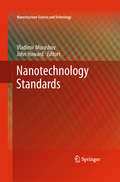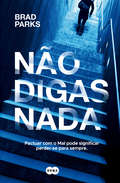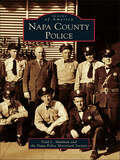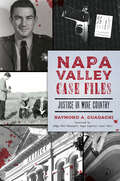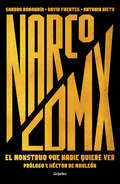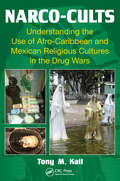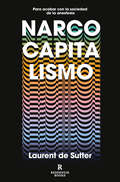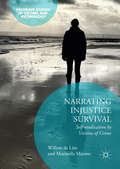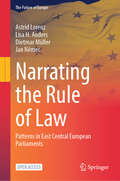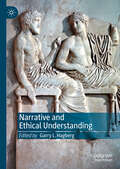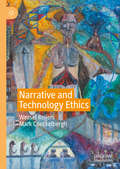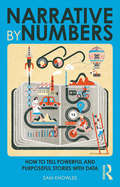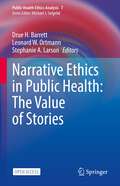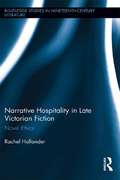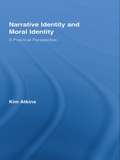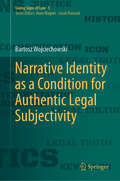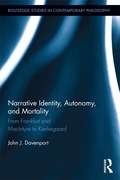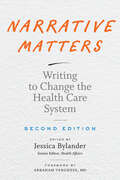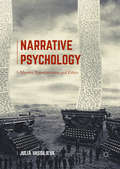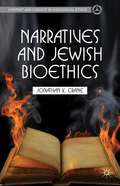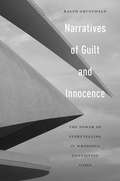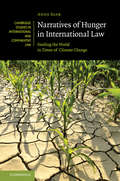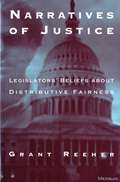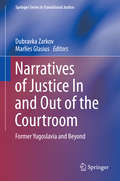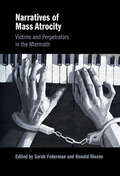- Table View
- List View
Nanotechnology Standards
by Vladimir Murashov John HowardWritten by a team of experts, Nanotechnology Standards provides the first comprehensive, state-of-the-art reviews of nanotechnology standards development, both in the field of standards development and in specific areas of nanotechnology. It also describes global standards-developing processes for nanotechnology, which can be extended to other emerging technologies. For topics related to nanotechnology, the reviews summarize active areas of standards development, supporting knowledge and future directions in easy-to-understand language aimed at a broad technical audience. This unique book is also an excellent resource for up-to-date information on the growing base of knowledge supporting the introduction of nanotechnology standards and applications into the market.
Não digas nada
by Brad ParksPactuar com o Mal pode significar perder-se para sempre. Um romance intenso que explora o lado mais obscuro do Mal, pondo a nu as fragilidades da natureza humana perante a ameaça da perda mais dolorosa. Um juiz vive um pesadelo e um terrível dilema moral quando os seus gémeos de seis anos são raptados. Para manter os filhos vivos, terá de obedecer cegamente às ordens dos raptores, que lhe exigem uma série de decisões controversas na sua sala de tribunal. Numa quarta-feira como qualquer outra, o juiz Scott Sampson prepara-se para ir buscar os filhos gémeos de seis anos para os levar à aula de natação. A sua mulher, Alison, envia-lhe uma mensagem: mudança de planos, ela tem de os levar ao médico. Assim sendo, Scott regressa a casa mais cedo. Mas quando, mais tarde, Alison chega, está sozinha - sem Sam, sem Emma - e nega ter conhecimento da mensagem# O telefone toca: uma voz anónima diz-lhes que o juiz deve fazer exacta-mente o que lhe é dito num caso de tráfico de droga que está prestesa ser julgado. Se recusar, as consequências para as crianças serão terríveis. Para Scott e Alison, a chamada do sequestrador é apenas o começo de uma tentativa tortuosa de chantagem, engano e terror. Não haverá nada que os detenha para recuperarem os filhos, não importa a que custo... Sobre Não digas nada: «Complicações e reviravoltas conduzem trepidantemente a trama para um clímax inesperado que é perfeito e comovente.»Library Journal «Prende o leitor desde a primeira página e não o deixa até o twist final.»Associated Press «As páginas finais são emocionantes, surpreendentes e profundamente emocionantes. Um novo nível no thriller.»The Washington Post «Não digas nada começa chocando a mente e acaba por destruir o coração. O trabalho de um autor que continua a refinar seu imenso talento. Os leitores vão adorar este thriller fascinante e perturbador.»The Richmond Times-Dispatch «O excelente thriller de Parks, premiado com o prémio Shamus, retrata de forma credível uma família sob stress severo. Os leitores não conseguirão parar de ler até terem todas as revelações.»Publishers Weekly «Um livro excecional. Realmente fantástico.»Sue Grafton «Excelente... começa com um estrondo e fica mais tenso e tenso. Não digas nada demonstra que Parks é um escritor de qualidade no seu melhor.»Lee Child «Alarmantemente plausível e consistentemente admirável.»Sunday Times - THRILLER DO MÊS «Inteligente, com ritmo, com uma série de reviravoltas à medida que a tensão aumenta até um clímax emocionalmente imprevisível.»Chris Pavone
Napa County Police (Images of America)
by Todd L. Shulman Napa Police Historical SocietyThe story of organized law enforcement in Napa County begins with the very first meeting of the board of supervisors in 1850 and the appointment of a county sheriff and marshals for each township. Thefoundations for progress and prosperity in place, Napa County grew from a remote agricultural outpost to the preeminent wine-growing region in the United States and a booming tourist destination�and policinghas kept pace. Today, in addition to the Napa Sheriff�s Department, the county is protected by the California Highway Patrol and three police departments: Napa, St. Helena, and Calistoga. Specialized police agencies have also grown out of unique needs, including the Napa State Hospital Police, Railroad Police, and Community College Police.
Napa Valley Case Files: Justice in Wine Country (True Crime)
by Raymond A. GuadagniWell known for its picturesque setting, Napa Valley is also home to crimes perpetrated in the name of greed, love and rage.Shocking incidents have rocked the small communities nestled among the vineyards, like that of greedy young Billy Duvall, who killed his parents as they slept, and Bob Edwards, who suffocated his beloved wife in a misguided attempt to keep a promise. Two victims of domestic violence came to very different ends--one murdered and the other offered a second chance at life after a jail sentence.Join author and retired Napa Superior Court judge Raymond A. Guadagni as he offers his unique perspective on these notorious court cases and the criminal justice system.
Narco CDMX: El monstruo que nadie quiere ver
by Sandra Romandia David Fuentes Antonio NietoEl narco inunda el país... excepto la Ciudad de México. Por increíble que parezca, ése ha sido el discurso oficial de todos los gobernantes que ha tenido la capital del país. Ningún jefe de gobierno, nunca, ha aceptado que los cárteles campean en el corazón de México. Este libro los refuta y evidencia el problema. Caso a caso, documenta qué grupos se pelean las 16 alcaldías, cómo operan, qué está en juego y de qué tamaño es el monstruo que las autoridades se niegan a ver. Aquí está todo. Así, Narco CDMX demuestra que, en el ajedrez del crimen organizado, la Ciudad de México juega un rol muchísimo más importante de lo que se pensaba. Y alerta: seguir ignorando el desastre pone en riesgo la viabilidad de toda la nación. Es la última llamada. Prólogo de Héctor de Mauleón
Narco-Cults: Understanding the Use of Afro-Caribbean and Mexican Religious Cultures in the Drug Wars
by Tony M. KailThose who know about how spirituality plays into the world of drug smuggling have likely heard of Santa Muerte, Jesus Malverde, and Santer but the details of the more obscure African religions and Latin American folk saints and cults often remain a mystery. While the vast majority of these religions are practiced by law-abiding citizens with no co
Narcocapitalismo: Para acabar con la sociedad de la anestesia
by Laurent de SutterDescubre al enfant terrible de la filosofía francófona. Cómo romper con las emociones inducidas y recuperar los sentimientos reales. Antidepresivos, somníferos, cocaína, analgésicos. Nuestras vidas parecen farmacias. Ya no podemos funcionar sin la ayuda de sustancias químicas: una pastilla para despertar, otra para trabajar, la siguiente para salir de fiesta, otra para evitar la resaca y la última para dormir. Vivimos en la era de la anestesia, somos una sociedad narcotizada al gusto del capital: un cuerpo social apático, reclutado y dopado para mantener el ritmo de producción alto y el orden establecido intacto. ¿Qué tienen en común la invención de la anestesia a mediados del siglo XIX, el empleo que dieron los nazis a la cocaína y el desarrollo del Prozac? Son productos con una misma lógica: el control de las emociones y el abandono de la excitación. Hemos olvidado lo que es el entusiasmo porquela única excitación que conocemos está inducida por los fármacos. Este provocador ensayo indaga en la historia, el psicoanálisis, la filosofía y la economía para llamarnos a abandonar la estimulación narcótica y encontrar el camino de vuelta a la excitación política y colectiva: ese es el mayor miedo del narcocapitalismo. La crítica ha dicho...«Una de las figuras más destacadas del mundo intelectual contemporáneo.»Actualitté «De Sutter nos invita a rechazar el adormecimiento de los sentidos.»Livres Hebdo «Un gran libro, poderoso y original, que nos hace pensar más allá de lo que parece abordar.»Diacritik «Un libro fascinante que se puede leer de varias maneras: como una breve historia de la psicofarmacología moderna, como una teoría política contemporánea basada en la anestesia del cuerpo social, o como una demolición filosófica de la dimensión ontológica de la depresión. Debería ser lectura obligatoria para cualquier filósofo, psicoanalista o activista social interesado en conocer la excitación que produce una aventura intelectual auténtica.»Franco “Bifo” Berardi, autor de La máquina de la infelicidad y Fenomenología del fin
Narrating Injustice Survival: Self-medication by Victims of Crime (Palgrave Studies in Victims and Victimology)
by Willem De Lint Marinella MarmoThis book explores the role of self-medication in reflexive response to victimhood and victim recovery. Based on interviews, counsellor focus groups and a self-medication survey, it situates self-medication among the coping strategies that may be set in formal and informal networks. Victims primarily seek validation, and this book reviews self-medication with particular focus on how victim-survivors develop a variety of reflexive responses in their attempt to carve out a dignified response to victimization. Validation may be achieved through the pursuit of justice, but many victims suffer from multiple or complex victimisation, with limited social chances necessary to achieve a just outcome. Routines, beliefs and an ordered pathway distinguish a dignified identity and more or less successful recovery adaptations. This book also addresses the practical implications of the findings for support organisations.
Narrating the Rule of Law: Patterns in East Central European Parliaments (The Future of Europe)
by Astrid Lorenz Lisa H. Anders Dietmar Müller Jan NěmecThis open access book deals with the backsliding of the rule of law in Poland and Hungary as one of the main problems of the EU. What began as a national phenomenon has become a general threat for the EU because the respect for the rule of law is a prerequisite for all other values of the EU enshrined in Article 2 of the Treaty on European Union. Media coverage and scholarly publications on these developments mainly focus on backsliding governments and judicial decisions concerning the issue. This book aims to inform the debate by adding another perspective and providing a broader view. Drawing on a comprehensive collection of parliamentary debates, we explore how MPs in Poland, Hungary, but also the Czech Republic, Slovakia and Romania referred to the rule of law from 1990 to 2021 and how their narratives differed across parties, countries and time.
Narrative and Ethical Understanding
by Garry L. HagbergThere has been a steady stream of articles written on the relations between ethics and the interpretation of literature, but there remains a need for a book that both introduces and significantly contributes to the field – particularly one that shows how we can think more openly and creatively about the multiform powers of ethical narrative by considering ethically significant literature. This volume offers an analytically acute and culturally rich way of understanding how it is that we can productively think philosophically about the narrative structures that describe our ethical lives and what kind of distinctive conceptual, and in some cases personal, progress we can make by doing so. Given the extremely widespread interest in ethical issues, this volume will strike resonant chords far and wide on arrival, while offering something new in bringing together the study of long-form narrative, the language of moral psychology, and detailed literary case studies. Given the vast expansion of narrative studies in recent years, the time for just such a volume is right.
Narrative and Technology Ethics
by Wessel Reijers Mark CoeckelberghThis book proposes that technologies, similar to texts, novels and movies, ‘tell stories’ and thereby configure our lifeworld in the Digital Age. The impact of technologies on our lived experience is ever increasing: innovations in robotics challenge the nature of work, emerging biotechnologies impact our sense of self, and blockchain-based smart contracts profoundly transform interpersonal relations. In their exploration of the significance of these technologies, Reijers and Coeckelbergh build on the philosophical hermeneutics of Paul Ricouer to construct a new, narrative approach to the philosophy and ethics of technology. The authors take the reader on a journey: from a discussion of the philosophy of praxis, via a hermeneutic notion of technical practice that draws on MacIntyre, Heidegger and Ricoeur, through the virtue ethics of Vallor, and Ricoeur’s ethical aim, to the eventual construction of a practice method which can guide ethics in research and innovation. In its creation of a compelling hermeneutic ethics of technology, the book offers a concrete framework for practitioners to incorporate ethics in everyday technical practice.
Narrative by Numbers: How to Tell Powerful and Purposeful Stories with Data (Using Data Better)
by Sam KnowlesShortlisted for the Business Book of the Year Awards in the Sales and Marketing category. As jobs become increasingly similar, there are two skills that everyone needs if they’re going to thrive. These are the ability to interrogate and make sense of data, and the ability to use insights extracted from data to persuade others to act. Analytics + storytelling = influence. Humans are hardwired to respond to stories and story structure. Stories are how we make sense of and navigate the world. We respond best to stories that are based on evidence. But storytellers need to use data as the foundation of stories, not as the actual stories themselves. To be truly impactful, rational facts need to be presented with a veneer of emotion. The Big Data revolution means more data is available than ever. The trouble is, most people aren’t very numerate or good at statistics. Many find it hard to look at data and extract insights. Meanwhile, those for whom numbers hold no fear don’t always make the best storytellers. They mistakenly believe they need to prove their point by showing their workings. There are some simple and effective rules of data-driven storytelling that help everyone tell more compelling, evidence-based stories, whoever they need to convince. Narrative by Numbers shows you how.
Narrative Ethics in Public Health: The Value of Stories (Public Health Ethics Analysis #7)
by Drue H. Barrett Leonard W. Ortmann Stephanie A. LarsonThis Open Access book illustrates the power of stories to illuminate ethical concerns that arise in public health. It complements epidemiological or surveillance evidence, and reveals stakeholder perspectives crucial for public health practitioners to develop effective and ethical public health interventions. Because it relies on the natural and universal appeal of stories, the book also serves to introduce the field of public health to students considering a career in public health. The opening section of the book also serves as a more didactic introduction to public health ethics and the field of narrative ethics. It describes the field of public health ethics including ethical principles relevant to public health practice and research, and the advantages of a narrative ethics approach. That approach explores the problems and the ethical challenges of public health from the inside, from the perspective of those experiencing health problems to the challenges of those who must address these problems. The later sections consist of 14 chapters that present the actual stories of these public health problems and challenges. In narrative style they range from first person narratives of both practitioners and citizens, to analysis of published short stories. The problems and challenges they address include issues relating to justice concerns, surveillance and stigma, community values and the value of community, trust and the value of information, and freedom and responsibility. Specific public health topics include resource allocation, restricting liberty to protect the community from health threats, and the health impact of trauma, addiction, obesity and health disparities.
Narrative Hospitality in Late Victorian Fiction: Novel Ethics (Routledge Studies in Nineteenth Century Literature)
by Rachel HollanderBringing together poststructuralist ethical theory with late Victorian debates about the morality of literature, this book reconsiders the ways in which novels engender an ethical orientation or response in their readers, explaining how the intersections of nation, family, and form in the late realist English novel produce a new ethics of hospitality. Hollander reads texts that both portray and enact a unique ethical orientation of welcoming the other, a narrative hospitality that combines the Victorians’ commitment to engaging with the real world with a more modern awareness of difference and the limits of knowledge. While classic nineteenth-century realism rests on a sympathy-based model of moral relations, novels by authors such as George Eliot, Thomas Hardy, and Olive Schreiner present instead an ethical recognition of the distance between self and other. Opening themselves to the other in their very structure and narrative form, the visited texts both represent and theorize the ethics of hospitality, anticipating twentieth-century philosophy’s recognition of the limits of sympathy. As colonial conflicts, nationalist anxiety, and the intensification of the "woman question" became dominant cultural concerns in the 1870s and 80s, the problem of self and other, known and unknown, began to saturate and define the representation of home in the English novel. This book argues that in the wake of an erosion of confidence in the ability to understand that which is unlike the self, a moral code founded on sympathy gave way to an ethics of hospitality, in which the concept of home shifts to acknowledge the permeability and vulnerability of not only domestic but also national spaces. Concluding with Virginia Woolf’s reexamination of the novel’s potential to educate the reader in negotiating relations of alterity in a more fully modernist moment, Hollanders suggest that the late Victorian novel embodies a unique and previously unrecognized ethical mode between Victorian realism and a post-World- War-I ethics of modernist form.
Narrative Identity and Moral Identity: A Practical Perspective (Routledge Studies in Contemporary Philosophy #Vol. 14)
by Kim AtkinsThis book is part of the growing field of practical approaches to philosophical questions relating to identity, agency and ethics--approaches which work across continental and analytical traditions and which Atkins justifies through an explication of how the structures of human embodiment necessitate a narrative model of selfhood, understanding, and ethics.
Narrative Identity as a Condition for Authentic Legal Subjectivity (Living Signs of Law #5)
by Bartosz WojciechowskiThis book argues that omitting the component of narrative creates an irresolvable antinomy concerning the identity of the subject: between the subject and identical copies of itself in different situations, or between it and the identical subject as a substantial illusion, the elimination of which reveals the pure multitude of desires, emotions, and perceptions. The starting point of the considerations presented here is the conviction that knowledge of one’s own desires and preferred values is obtained by articulating a narrative identity through social interactions and mutually determined moral horizons that presuppose shared meanings and the possibility of consensus. The book emphasizes the significance of personal narration and identity formation, but also points out that collective narrative, which is culturally and traditionally rooted, is also one’s own narrative. It focuses on the issue of identity, which is discussed today in numerous contexts, and the understanding of which, according to the author, has important consequences, including: for the legal aspects of our lives, as it concerns, for example, the rights of LGBTQ+ people or entities marginalized or excluded for various reasons. The titular narrative identity of an authentic legal entity is related to opening ourselves to others, but also to ourselves. The interdisciplinary research perspective adopted in the book combines literary aspects, philosophical, sociological and theoretical-legal considerations with an analysis of the jurisprudence of European tribunals.
Narrative Identity, Autonomy, and Mortality: From Frankfurt and MacIntyre to Kierkegaard (Routledge Studies in Contemporary Philosophy)
by John J. DavenportIn the last two decades, interest in narrative conceptions of identity has grown exponentially, though there is little agreement about what a "life-narrative" might be. In connecting Kierkegaard with virtue ethics, several scholars have recently argued that narrative models of selves and MacIntyre's concept of the unity of a life help make sense of Kierkegaard's existential stages and, in particular, explain the transition from "aesthetic" to "ethical" modes of life. But others have recently raised difficult questions both for these readings of Kierkegaard and for narrative accounts of identity that draw on the work of MacIntyre in general. While some of these objections concern a strong kind of unity or "wholeheartedness" among an agent's long-term goals or cares, the fundamental objection raised by critics is that personal identity cannot be a narrative, since stories are artifacts made by persons. In this book, Davenport defends the narrative approach to practical identity and autonomy in general, and to Kierkegaard's stages in particular.
Narrative Matters: Writing to Change the Health Care System
by Jessica BylanderDrawn from the popular "Narrative Matters" column in the journal Health Affairs, these essays embody a vision for a health care system that centers the humanity of patients and doctors alike.Health care decision making affects patients and families first and foremost, yet their perspectives are not always factored into health policy deliberations and discussions. In this anthology, Jessica Bylander brings together the personal stories of the patients, physicians, caregivers, policy makers, and others whose writings add much-needed human context to health care decision making.Drawn from the popular "Narrative Matters" column in the leading health policy journal Health Affairs, this collection features essays by some of the leading minds in health care today, including Pulitzer Prize–winner Siddhartha Mukherjee, MacArthur fellow Diane Meier, former Planned Parenthood president Leana S. Wen, and former secretary of health and human services Louis W. Sullivan. The collection also presents important stories from lesser-known voices, including a transgender doctor in Oklahoma who calls for better treatment of trans patients and a palliative care physician who reflects on how perspectives on hastening death have changed in recent years. A foreword written by National Humanities Medal recipient Abraham Verghese, MD, further rounds out the book.The collection of thirty-two essays is organized around several themes:• the practice of medicine • medical innovation and research• patient-centered care• the doctor-patient relationship• disparities and discrimination• aging and end-of-life care• maternity and childbirth• opioids and substance abuseContributors: Louise Aronson, Laura Arrowsmith, Cheryl Bettigole, Cindy Brach, Gary Epstein-Lubow, Jonathan Friedlaender, Patricia Gabow, Katti Gray, Yasmin Sokkar Harker, Timothy Hoff, Carla Keirns, Raya Elfadel Kheirbek, Katy B. Kozhimannil, Pooja Lagisetty, Maria Maldonado, Maureen A. Mavrinac, Diane E. Meier, Dina Keller Moss, Siddhartha Mukherjee, Donna Jackson Nakazawa, Travis N. Rieder, Aroonsiri Sangarlangkarn, Elaine Schattner, Janice Lynch Schuster, Myrick C. Shinall, Gayathri Subramanian, Louis W. Sullivan, Gautham K. Suresh, Abraham Verghese, Otis Warren, Leana S. Wen, Charlotte Yeh
Narrative Psychology
by Julia VassilievaThis book provides the first comparative analysis of thethree major streams of contemporary narrative psychology as they have beendeveloped in North America, Europe, and Australia and New Zealand. Interrogating the historical and cultural conditions in which this importantmovement in psychology has emerged, the book presents clear, well-structuredcomparisons and critique of the key theories of narrative psychology pioneeredacross the globe. Examples include Dan McAdams in the US and his followers, whohave developed a distinctive approach to self and identity as a life story overthe past two decades; in the Netherlands by Hubert Hermans, whose research onthe 'dialogical self' has made the University of Nijmegen a centre of narrativepsychological research in Europe; and in Australia and New Zealand, where thecollaborative efforts of Michael White and David Epston helped to launch thenarrative movement in psychotherapy in the late 1980s.
Narratives and Jewish Bioethics
by Jonathan K. CraneNarratives and Jewish Bioethics searches for answers to the critical question of what roles ancient narratives play in creating modern norms by Jewish bioethicists utilizing the Jewish textual tradition.
Narratives of Guilt and Innocence: The Power of Storytelling in Wrongful Conviction Cases
by Ralph Grunewald2023 Co-Winner of the Herbert Jacob Book Prize, given by the Law and Society AssociationIllustrates how the power of narrative influences how police, prosecutors, juries, and judges constructlegal realityWrongful convictions have been studied primarily through the lenses of law, psychology, and the social sciences. Though scholarship has established canonical factors that help explain why the innocent are convicted, a very simple question has not been answered: How is it possible that prosecutors can convince juries and themselves of the guilt of an innocent defendant, often even against strong exculpatory evidence? Narratives of Guilt and Innocence seeks to address this crucial question by highlighting the narrative blueprint of a given criminal justice system and then how the power of narrative influences how police, prosecutors, juries, and judges construct legal reality and the evidence for it. That law and storytelling are connected is a common trope, but we know surprisingly little about the intricate role storytelling plays in criminal cases and wrongful convictions in particular.This book questions the effectiveness of the adversarial contest between prosecutor and defense as a means to arrive at the truth and argues that narrative is an important a factor in the construction of legal reality. Wrongful convictions exemplify that narrative and truth have an uncomfortable relationship. Ralph Grunewald provides a retelling and reading of well-known miscarriages of justice, including the best-known wrongful conviction in Germany. Applying a comparative perspective shows that the narrative desire as a human trait has a universal power with a persistence that transcends the regulatory and procedural setup of a given system.Narratives of Guilt and Innocence puts wrongful convictions into an interdisciplinary and comparative context and vividly demonstrates just how much the process of storytelling affects legal reality.
Narratives of Hunger in International Law: Feeding the World in Times of Climate Change (Cambridge Studies in International and Comparative Law #140)
by Anne SaabThis book explores the role that the language of international law plays in constructing understandings - or narratives - of hunger in the context of climate change. The story is told through a specific case study of genetically engineered seeds purportedly made to be 'climate-ready'. Two narratives of hunger run through the storyline: the prevailing neoliberal narrative that focuses on increasing food production and relying on technological innovations and private sector engagement, and the oppositional and aspirational food sovereignty narrative that focuses on improving access to and distribution of food and rejects technological innovations and private sector engagement as the best solutions. This book argues that the way in which voices in the neoliberal narrative use international law reinforces fundamental assumptions about hunger and climate change, and the way in which voices in the food sovereignty narrative use international law fails to question and challenge these assumptions.
Narratives of Justice In and Out of the Courtroom
by Dubravka Zarkov Marlies GlasiusThis volume considers the dynamic relations between the contemporary practices of international criminal tribunals and the ways in which competing histories, politics and discourses are re-imagined and re-constructed in the former Yugoslavia and beyond. There are two innovative aspects of the book - one is the focus on narratives of justice and their production, another is in its comparative perspective. While legal scholars have tended to analyze transitional justice and the international war tribunals in terms of their success or failure in establishing the facts of war crimes, this volume goes beyond mere facts and investigates how the courts create a symbolic space within which competing narratives of crimes, perpetrators and victims are produced, circulated and contested. It analyzes how international criminal law and the courts gather, and in turn produce, knowledge about societies in war, their histories and identities, and their relations to the wider world. Moreover, the volume situates narratives of transitional justice in former Yugoslavia both within specific national spaces - such as Serbia, and Bosnia - and beyond the Yugoslav. In this way it also considers experiences from other countries and other times (post-World War II) to offer a sounding board for re-thinking the meanings of transitional justice and institutions within former Yugoslavia. Included in the volume's coverage is a look at the Rwandan tribunals, the trials of Charles Taylor, Radovan Karadzic, the Srebrenica genocide, and other war crimes and criminals in the Yugoslav. Finally, it frames all of those narratives and experiences within the global dynamics of legal, social and geo-political transformations, making it an excellent resource for social science researchers, human rights activists, those interested in the former Yugoslavia and international relations, and legal scholars.
Narratives of Mass Atrocity: Victims and Perpetrators in the Aftermath
by Sarah Federman Ronald NiezenIndividuals can assume—and be assigned—multiple roles throughout a conflict: perpetrators can be victims, and vice versa; heroes can be reassessed as complicit and compromised. However, accepting this more accurate representation of the narrativized identities of violence presents a conundrum for accountability and justice mechanisms premised on clear roles. This book considers these complex, sometimes overlapping roles, as people respond to mass violence in various contexts, from international tribunals to NGO-based social movements. Bringing the literature on perpetration in conversation with the more recent field of victim studies, it suggests a new, more effective, and reflexive approach to engagement in post-conflict contexts. Long-term positive peace requires understanding the narrative dynamics within and between groups, demonstrating that the blurring of victim-perpetrator boundaries, and acknowledging their overlapping roles, is a crucial part of peacebuilding processes. This title is also available as Open Access on Cambridge Core.
